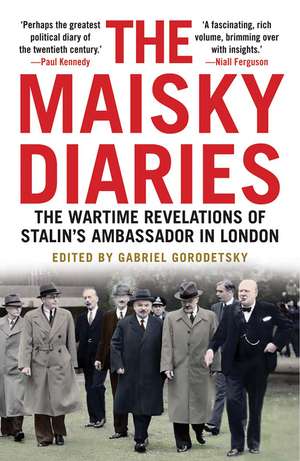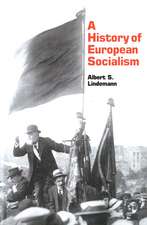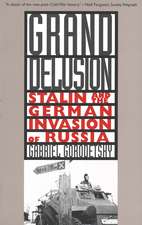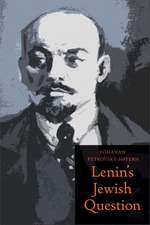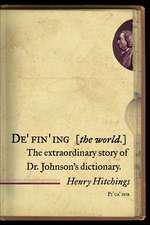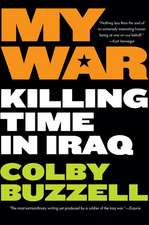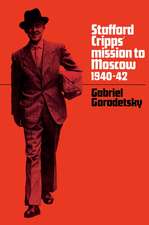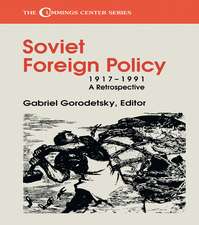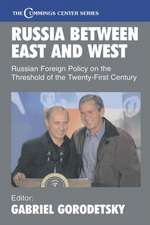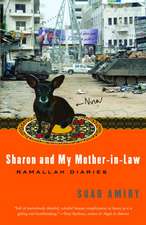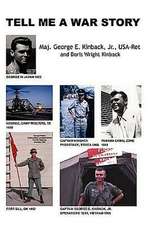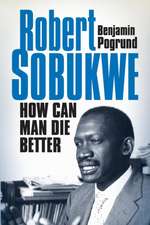The Maisky Diaries: The Wartime Revelations of Stalin's Ambassador in London
Autor Ivan Maisky Editat de Gabriel Gorodetskyen Limba Engleză Paperback – 23 aug 2016
Highlights
of
the
extraordinary
wartime
diaries
of
Ivan
Maisky,
Soviet
ambassador
to
London
The terror and purges of Stalin’s Russia in the 1930s discouraged Soviet officials from leaving documentary records let alone keeping personal diaries. A remarkable exception is the unique diary assiduously kept by Ivan Maisky, the Soviet ambassador to London between 1932 and 1943. This selection from Maisky's diary, never before published in English, grippingly documents Britain’s drift to war during the 1930s, appeasement in the Munich era, negotiations leading to the signature of the Ribbentrop–Molotov Pact, Churchill’s rise to power, the German invasion of Russia, and the intense debate over the opening of the second front.
Maisky was distinguished by his great sociability and access to the key players in British public life. Among his range of regular contacts were politicians (including Churchill, Chamberlain, Eden, and Halifax), press barons (Beaverbrook), ambassadors (Joseph Kennedy), intellectuals (Keynes, Sidney and Beatrice Webb), writers (George Bernard Shaw, H. G. Wells), and indeed royalty. His diary further reveals the role personal rivalries within the Kremlin played in the formulation of Soviet policy at the time. Scrupulously edited and checked against a vast range of Russian and Western archival evidence, this extraordinary narrative diary offers a fascinating revision of the events surrounding the Second World War.
The terror and purges of Stalin’s Russia in the 1930s discouraged Soviet officials from leaving documentary records let alone keeping personal diaries. A remarkable exception is the unique diary assiduously kept by Ivan Maisky, the Soviet ambassador to London between 1932 and 1943. This selection from Maisky's diary, never before published in English, grippingly documents Britain’s drift to war during the 1930s, appeasement in the Munich era, negotiations leading to the signature of the Ribbentrop–Molotov Pact, Churchill’s rise to power, the German invasion of Russia, and the intense debate over the opening of the second front.
Maisky was distinguished by his great sociability and access to the key players in British public life. Among his range of regular contacts were politicians (including Churchill, Chamberlain, Eden, and Halifax), press barons (Beaverbrook), ambassadors (Joseph Kennedy), intellectuals (Keynes, Sidney and Beatrice Webb), writers (George Bernard Shaw, H. G. Wells), and indeed royalty. His diary further reveals the role personal rivalries within the Kremlin played in the formulation of Soviet policy at the time. Scrupulously edited and checked against a vast range of Russian and Western archival evidence, this extraordinary narrative diary offers a fascinating revision of the events surrounding the Second World War.
Preț: 121.59 lei
Nou
Puncte Express: 182
Preț estimativ în valută:
23.27€ • 25.29$ • 19.56£
23.27€ • 25.29$ • 19.56£
Carte disponibilă
Livrare economică 31 martie-14 aprilie
Livrare express 15-21 martie pentru 41.34 lei
Preluare comenzi: 021 569.72.76
Specificații
ISBN-13: 9780300221701
ISBN-10: 0300221703
Pagini: 632
Ilustrații: 72 b-w illus.
Dimensiuni: 156 x 235 x 46 mm
Greutate: 0.82 kg
Editura: Yale University Press
Colecția Yale University Press
ISBN-10: 0300221703
Pagini: 632
Ilustrații: 72 b-w illus.
Dimensiuni: 156 x 235 x 46 mm
Greutate: 0.82 kg
Editura: Yale University Press
Colecția Yale University Press
Recenzii
‘Recently
discovered
diaries
by
the
Soviet
ambassador
to
the
UK
from
1932
give
fascinating
insights
into
Britain
before
and
during
the
war.’
-The
Sunday
Times
"It is a book that makes us understand the period of appeasement afresh, tells the human story of an un-Bolshevik character teetering on the edge of Stalinist disaster, and reminds us just how important great diplomats have been in dangerous times."—Andrew Marr, New Statesman
"These diaries throw new light from a fresh angle on the lead-up to 1939 and the subsequent course of the war . . . this is an exceptionally readable, as well as important, story."—John Joliffe, Spectator
Notă biografică
Gabriel Gorodetsky is a Quondam Fellow of All Souls College, Oxford, and emeritus professor of history at Tel Aviv University.
Descriere
Highlights of the extraordinary wartime diaries of Ivan Maisky, Soviet ambassador to London
The terror and purges of Stalin’s Russia in the 1930s discouraged Soviet officials from leaving documentary records let alone keeping personal diaries. A remarkable exception is the unique diary assiduously kept by Ivan Maisky, the Soviet ambassador to London between 1932 and 1943. This selection from Maisky's diary, never before published in English, grippingly documents Britain’s drift to war during the 1930s, appeasement in the Munich era, negotiations leading to the signature of the Ribbentrop–Molotov Pact, Churchill’s rise to power, the German invasion of Russia, and the intense debate over the opening of the second front.
Maisky was distinguished by his great sociability and access to the key players in British public life. Among his range of regular contacts were politicians (including Churchill, Chamberlain, Eden, and Halifax), press barons (Beaverbrook), ambassadors (Joseph Kennedy), intellectuals (Keynes, Sidney and Beatrice Webb), writers (George Bernard Shaw, H. G. Wells), and indeed royalty. His diary further reveals the role personal rivalries within the Kremlin played in the formulation of Soviet policy at the time. Scrupulously edited and checked against a vast range of Russian and Western archival evidence, this extraordinary narrative diary offers a fascinating revision of the events surrounding the Second World War.
The terror and purges of Stalin’s Russia in the 1930s discouraged Soviet officials from leaving documentary records let alone keeping personal diaries. A remarkable exception is the unique diary assiduously kept by Ivan Maisky, the Soviet ambassador to London between 1932 and 1943. This selection from Maisky's diary, never before published in English, grippingly documents Britain’s drift to war during the 1930s, appeasement in the Munich era, negotiations leading to the signature of the Ribbentrop–Molotov Pact, Churchill’s rise to power, the German invasion of Russia, and the intense debate over the opening of the second front.
Maisky was distinguished by his great sociability and access to the key players in British public life. Among his range of regular contacts were politicians (including Churchill, Chamberlain, Eden, and Halifax), press barons (Beaverbrook), ambassadors (Joseph Kennedy), intellectuals (Keynes, Sidney and Beatrice Webb), writers (George Bernard Shaw, H. G. Wells), and indeed royalty. His diary further reveals the role personal rivalries within the Kremlin played in the formulation of Soviet policy at the time. Scrupulously edited and checked against a vast range of Russian and Western archival evidence, this extraordinary narrative diary offers a fascinating revision of the events surrounding the Second World War.
